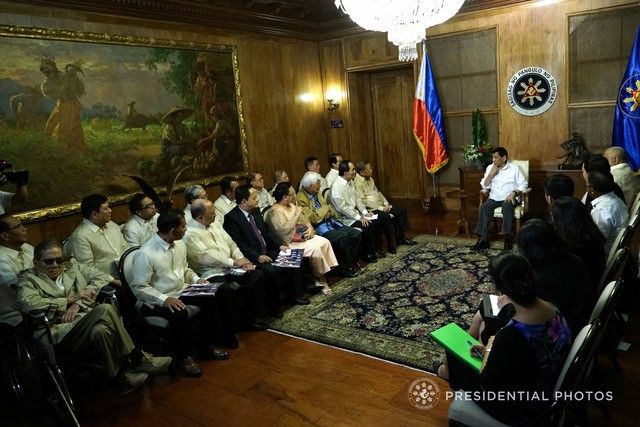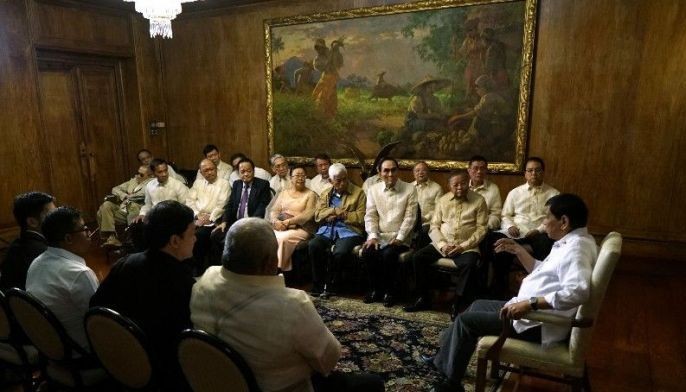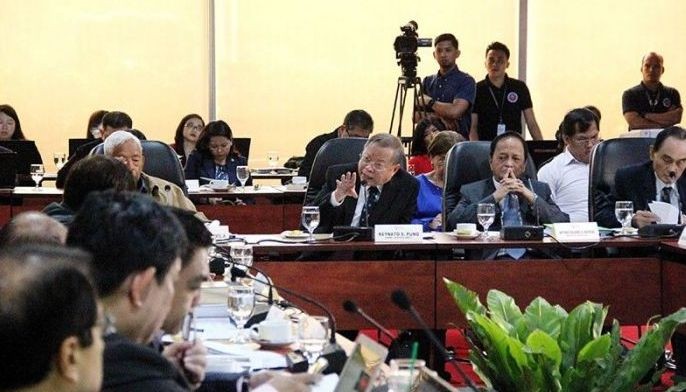Why the draft charter's transitory provisions are raising alarms

MANILA, Philippines — Critics have raised concerns over the draft federal constitution's transitory provisions as it promotes indefinite term extension in case an election in May 2022 would not push through.
Presidential spokesperson Harry Roque earlier said that President Rodrigo Duterte has ordered the consultative committee to change the transitory provisions of the approved draft.
In the draft charter, Duterte will serve as chairman of the Federal Transition Commission and will lead a 10-member team, which he will also appoint. The commission will end its mandate by June 30, 2022.
While the Philippines is under transition, Duterte and the FTC are authorized to "exercise all powers necessary and proper to ensure a smooth, speedy and successful transition."
Section 2(b) of Article XXII states that, "For the proper execution of the transition plan, it shall promulgate the necessary rules, regulations, orders, decrees, proclamations, and other issuances, do all acts to implement the same, and resolve all issues and disputes that may arise therefrom."
Section 8 of Article XXII also indicates that, "All officials of the government under the 1987 Constitution shall continue to hold their office and exercise their respective powers and duties under such terms and conditions as may be provided in the transition plan."
The first national, regional and local elections under the new constitution is supposed to be held on the 2nd Monday of May 2022.
However, failure to hold elections by May 2022 would indefinitely extend the terms of those who were elected before the transition period, including Duterte.
The unlimited power vested upon Duterte and the FTC would set the stage for "constitutional authoritarianism," according to critics.
University of the Philippines professor emeritus Solita "Winnie" Monsod warned that similar transitory provisions gave ousted dictator Ferdinand Marcos dictatorial powers.
"This is the very same thing. There is a term for it: constitutional authoritarianism. This is what Mr. Duterte must have had in mind when he talked of a revolutionary government," Monsod said in a column published by the Philippine Daily Inquirer on Saturday.
The 1973 Constitution changed the form of government from presidential to parliamentary, allowing Marcos to stay in power beyond that year.
The transitory provisions of the 1973 Charter stated that the incumbent president and vice president, members of the 1971 constitutional convention, and members of the Senate and House of Representatives would form the Interim National Assembly.
The incumbent president, who was then Marcos, was supposed to initially convene the Interim National Assembly until an interim Speaker has been elected.
Marcos declared martial law on Sept. 21, 1972, less than a year before a new constitution was approved. He claimed that his declaration of martial law was a "prelude" to creating his "Bagong Lipunan" or new society. Martial law, however, would not be lifted until Jan. 17, 1981.
Marcos would, later on, be ousted in 1986, paving the way for a new constitution in 1987.
Transitory provisions of the 1987 Constitution was more specific in terms of the term limits of elected government officials. The six-year terms of then President Corazon Aquino and Vice President Salvador Laurel, elected on Feb. 7, 1986, were extended to noon of June 30, 1992, for synchronization purposes.
Senators, members of the House of Representatives and local officials first elected under the new constitution would also be in office until June 30, 1992. The top 12 senators elected in 1992 would serve for six years while the remaining 12 for three years.
In the draft federal constitution, the term of the president and vice president, which will end on June 30, 2022, will not be extended. This would be the scenario if the first election under the new charter would push through on May 2022.
According to Malacañang, Duterte wants his term to end as early as 2019 to be coterminous with the start of the transition period.
"He asked that there be a provision in the proposed draft constitution that the position of transitory leader should be elected by the people," presidential spokesperson Harry Roque told reporters.
The consultative committee, tasked with drafting a new constitution, eyes the removal of the impeachment power of Congress over justices of the Constitutional Court, one of the proposed three Supreme Courts under the draft charter.
READ: Concom eyes 3 supreme courts
Concom proposes that the impeachment of justices in Constitutional Court be decided instead by the 15-member Supreme Court.
The proposed Constitutional Court will have a presiding justice appointed by the Supreme Court and six associate justices with two appointees each from three branches of government.
LIST: Controversial features of proposed federal charter by House sub-committee
— with Edu Punay
The faction of PDP-Laban chaired by former President Rodrigo Duterte has agreed in a meeting earlier today to support Charter change, says Melvin Matibag, the party's secretary-general
— Philstar.com/Xave Gregorio
The House of Representatives votes 301-7 to pass on final reading House Bill 7352 or the proposed Constitutional Convention Act to amend the 1987 Constitution. — Cristina Chi
The House of Representatives approves on second reading House Bill 7352 or the act implementing Resolution of Both Houses No. 6, calling for a constitutional convention to propose amendments to, or revision of, the 1987 Philippine Constitution. — The STAR
With a vote of 301-6 and one abstain, the House of Representatives approves on third and final reading Resolution of Both Houses 6 calling for a constitutional convention. — Cristina Chi
- Latest
- Trending



































